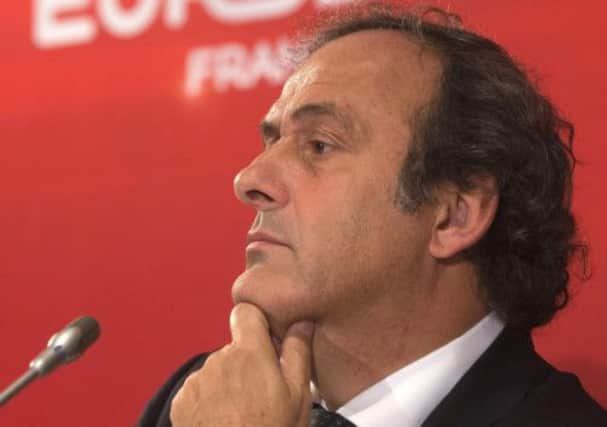Turks rocked as zero tolerance approach brings timely warning


At club level, meanwhile, sides from Istanbul were no strangers to the latter stages of the Champions League and Uefa Cup, with Galatasaray even lifting the latter in 2000.
Today, however, the contrast to those heady days could not be more marked for Turkish football with the national team’s fortunes having suffered a steep decline and the domestic game being rocked by match-fixing allegations.
Advertisement
Hide AdAdvertisement
Hide AdJust last Monday, Uefa upheld bans from European competition for Fenerbahce and Besiktas for their part in the scandal. Further appeals have since been lodged with the Court of Arbitration for Sport but if those fail then Fenerbahce, Europa League semi-finalists in 2012-13, will have to sit out the next two seasons in Europe, while Cup holders Besiktas will be excluded for 12 months.
The news that the two clubs had failed to overturn the earlier ruling by Uefa in June was a new low for a country already weary of the manner in which Turkish football has been tarnished.
Allegations of match-fixing surfaced not long after the 2010-11 season, when Fenerbahce pipped Trabzonspor to the title thanks to a quite remarkable end of season run and Besiktas lifted the Cup by beating Buyuksehir on penalties.
The Cup final was one of 19 from that campaign highlighted in the subsequent police investigation that would eventually lead to criminal proceedings and a host of club executives being found guilty. Fenerbahce chairman Aziz Yildirim was jailed but later released on bail, pending an appeal.
Advertisement
Hide AdAdvertisement
Hide AdCondemnation swiftly followed from football’s governing bodies, Uefa’s Michel Platini, right, making it clear there would be “zero tolerance” for those involved. Uefa’s ban on Fenerbahce and Besiktas from European competition backed those words up with firm action.
What needs to happen now, however, is for the Turkish Football Federation to take a similarly tough stance.
As we stand – and, of course, there is still the appeal to the Court of Arbitration for Sport to be heard – Fenerbahce’s triumph in 2010-11 is still listed as their 18th title success. Equally, Besiktas’ Cup win over Istanbul BB remains on the club’s sporting roll of honours.
Both should be immediately expunged from history. Further punishment should also follow, a precedent having surely been set elsewhere in Europe not so long ago when Juventus were demoted to Serie B following a similar scandal.
Advertisement
Hide AdAdvertisement
Hide AdSurely that is the very least that has to happen in the wake of such a damaging episode.
The fear in Turkey, however, is that nothing of the sort will happen with Football Federation president Yildirim Demiroren having publicly stated last year that the attempts to manipulate matches “have not been reflected on the pitch”.
Such a stance was met with incredulity by supporters at the time, as was a suggestion later that those involved were individuals and that the clubs themselves should not be punished. Fears that the federation plan to sweep the entire matter under the carpet have only deepened since Monday’s rejection of the two appeals.
Adding to the downbeat atmosphere surrounding Turkish football right now is the recent Fifa Under-20s World Cup that was held in the country.
Advertisement
Hide AdAdvertisement
Hide AdThe tournament was played in front of swathes of empty seats as fans failed to turn out in the expected numbers. Whether this was down to disenchantment with football following a tough few years or to other factors such as the recent political protests is impossible to ascertain.
But what is beyond doubt is that the average crowd of 5,832 was by far the lowest in the 36-year history of the competition. In fact, the next worst average is the 9,667 set in Holland eight years ago – sparking fears that Turkey’s future hopes of staging major tournaments, such as the 2020 Olympics and the 2024 European Championships, could have been damaged.
For a nation that just five years ago came within a whisker of reaching the Euro 2008 final only a couple of months after Fenerbahce appeared in the last eight of the Champions League, the current travails are hard to take.
Mickey Walker, former Doncaster Rovers director of football, has taken a keen interest in Turkish football in recent years since being invited to visit while on a Uefa A-Licence course.
Advertisement
Hide AdAdvertisement
Hide Ad“What has happened to the game out there is a crying shame,” said the 68-year-old, who recently returned from a visit to Turkey. “There are some cracking players and I’d imagine the European ban could lead to some coming over here.
“I hope something can be done to turn things around.”
Just where Turkish football goes from here remains to be seen. But surely a change at the top is overdue with Demiroren, who was only elected in February, 2012 after a stint at the helm of Besiktas, in the firing line.
He came to the post with a pledge to lead the game to a brighter future but there is precious little evidence of this coming to pass. Instead, the image of Turkish football has only been tarnished further while the national team, now ranked 57th in the world after failing to qualify for the last two major finals, continue to struggle.
Change is needed and fast, with possible hope coming via suggestions that former president Haluk Ulusoy, a firm hand on the tiller of Turkish football for seven years until 2004 during what has to now be considered the glory days, is keen on a return.
If he does, maybe Turkey’s slide back towards the days when they were viewed as poor relations to the rest of Europe can be halted.